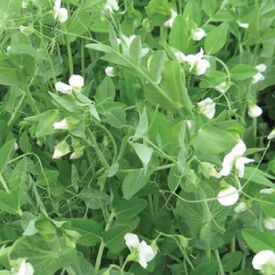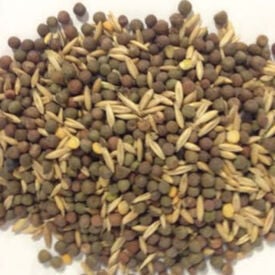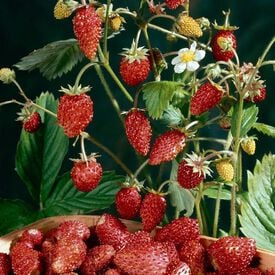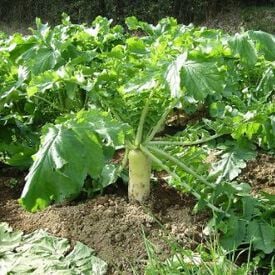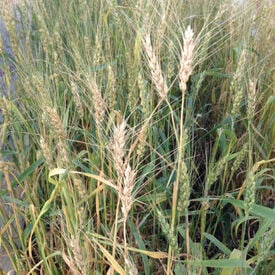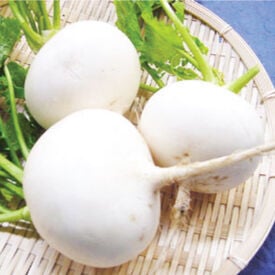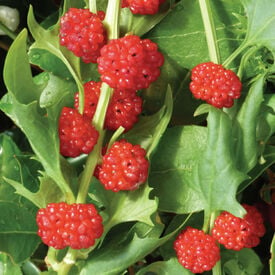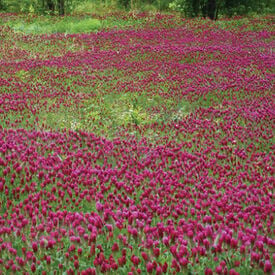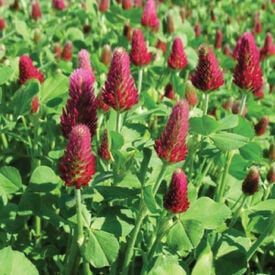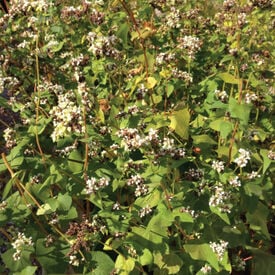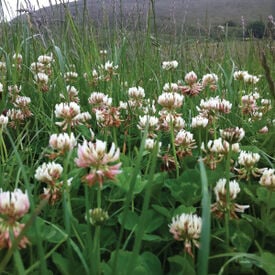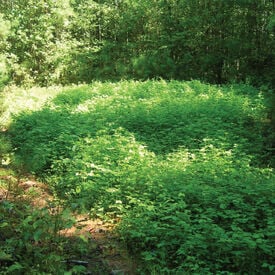The Austrian Winter Pea, sometimes called black pea or field pea, is a great cool season legume for cover crops, wildlife and winter grazing! This cool-season, annual legume has good, nitrogen-fixing capabilities. The Austrian Winter Pea is a low-growing, viny legume which has been shown to fix over 200 pounds of nitrogen per acre per year. It has hollow, slender and succulent stems, 2 to 4 feet long. The foliage is pale green, and the flowers are colored, usually purple, pink or reddish. Uses: Chicken forage, deer attractant, forage, green manure, nitrogen fixation, no till, organic matter (biomass), weed suppression
Using the Field Peas and Oats Blend throughout your garden is a great way to fix nitrogen and add organic matter to the soil! This blend contains a great ratio of grass and legume cover crop for fixing nitrogen, winter cover, weed suppression and more. The Field Peas and Oats Blend should be sown from early spring to late summer. Sow no later than 6 weeks before first fall frost in your area. This variety is gold hardy enough to grow long into the fall leaving behind a great mulch for soil protection. (75% peas / 25% oats by weight) Seed Coverage: - 5 lbs covers 2,000-4,000 sqaure feet - 100 lbs covers 1-2 acres Uses: Deer Attractant, Green Manure, Nitrogen Fixation, No Till, Organic Matter (Biomass), Weed Suppression
'Mignonette' is the tastiest red alpine variety in our opinion. It has moderate production of 1" long conical shaped fruit has an aroma and taste unlike anything you've ever experienced. Not as hardy as some of the other selections so mulch well for winter in colder zones.
The Jackhammer Radish is a fast growing daikon radish variety that is a great scavenger that will start germinating immediately! This variety is very easy to grow. The Jackhammer Radish is good for winter kills and turns into great biomass. Radish (Brassica): Cool Season, broadleaf, Annual, Upright and spreading habit, Root Crop Uses: Nitrogen Scavenger, Green Manure, Forage, Organic Matter, Weed Suppression
The Winter Wheat is a cool weather grain that is quick to germinate, cold tolerant and is adaptable to a wide range of soils! This wheat can be sown in late summer for erosion control and tilled under in early spring to add organic matter. The Winter Wheat is winter hardy nearly anywhere, and won't go to seed until its second year of growth. Use: Erosion Control, Green Manure, Nitrogen Scavenger, No Till, Weed Suppression
The Seven Top is a tender, round and beautiful white globed turnip variety that produces consistently for a long period! This turnip is the best variety for producing masses of fine-flavored, old-fashioned, turnip greens that makes the ultimate southern staple!
Strawberry Spinach is a delicious fruit that is almost entirely edible. A beautiful plant with showy leaves and berries. It's triangular toothed leaves and tender shoots are great for salads. Shiny red mulberry-like fruits are edible and can be added to salads. Grown in Europe for centuries.
The Medium Red Clover is fast to establish and can be grown in most soil types as well as sowed in spring, summer or fall! This clover works well for hay or silage. The Medium Red Clover can be used as a cover crop between rows of vegetable crops if mowed to maintain manageability. This clover can fix up to 150 lb. of nitrogen per acre. Uses: Bees & Beneficial Insects, Chicken Forage, Compaction Control, Deer Attractant, Erosion Control, Forage, Green Manure, Nitrogen Fixation, No Till, Weed Suppression
The Crimson Clover is an attractive winter annual that can be planted fall or early spring and will protect and improve the soil. This good nitrogen fixer (70-150 lbs per acre per year) blooms showy crimson flowers in late spring that are an excellent source of nectar for bees. This variety inter-seeds well with grass, making it a great way to ready your vegetable garden for the spring or beautify a landscape! Not to be confused with the tough perennial clovers that can take over a meadow. Uses: Bees & Beneficial Insects, Chicken Forage, Compaction Control, Deer Attractant, Erosion Control, Forage, Green Manure, Nitrogen Fixation, No Till, Weed Suppression
The Common Buckwheat is a grain that can be planted late spring to early summer and improves top soil and an effective choke weed! This variety establishes quickly and matures in 60 days. This buckwheat accumulates phosphorus and and potassium for following crops and is frost sensitive. Buckwheat (Fagopyrum esculentum Moench): Cool Season, Grain, Annual, Upright growth habit, Enhances soil P availability,Crude protein: straw 5%, grain 13% Uses: Bees & Beneficial Insects, Green Manure, No Till, Organic Matter (Biomass), Weed Suppresion
The White Dutch Clover is a perennial clover variety that is a customer favorite for controlling erosion while protecting the soil! This legume is a living mulch of permanent cover that spreads by stolons. Grow low so takes close mowing and grazing. The White Dutch Clover benefits bees and insects as well as fixes nitrogen. Uses: Bees & Beneficial Insects, Chicken Forage, Deer Attractant, Erosion Control, Forage, Green Manure, Nitrogen Fixation, No Till, Weed Suppression
All of the seeds below are very good at attracting deer to your property! Buckwheat - Improves top soil and an effective choke weed! Plant late spring to early summer. Establishes quickly. Matures in 60 days. Accumulates phosphorus and and potassium for following crops. Frost sensitive. All below packages come in 1lb. bags. Crimson Clover - Winter annual protects and improves soil! Plant fall or early spring. A good nitrogen fixer (70-150 lbs per acre per year). Showy crimson blooms in late spring are an excellent source of nectar for bees. Inter-seeds well with grass. Austrian Winter Pea - A great cool season legume for cover crops, wildlife and winter grazing! Austrian winter pea, sometimes called "black pea" and "field pea" is a cool-season, annual legume with good, nitrogen-fixing capabilities. Austrian winter pea is a low-growing, viny legume which has been shown to fix over 200 pounds of nitrogen per acre per year. Peas - Grow regular old peas in your deer food plot. One of the most preferred vegetables for deer. Oats - Oats will kill off winter weeds and hold soil with a mat of vegetation! A high yielding oat that can produce over 100 bushels per acre. Plant anytime of the year. Deer will graze oats all year round. Barkant Forage Turnip - Great forage crop that provides high energy feed! Barkant turnips are an improved, early maturing, diploid turnip wtih a large purple tankard shaped bulb. Barkant turnips have a high leaf to stem ratio and and provide very high contentrations of protein, sugar content and leaf yields. Barkant Turnips are ideally suited for wildlife. Dwarf Essex Rape - A cabbage related plant that is a perfect grazer! Dwarf Essex Rape is a perfect grazer plant that will persist well after the first frost. Ready to pasture 6-8 weeks after sowing. Hairy Vetch - Sow with or without grain, grass or field peas! When sown late summer, grows fast and will attract wildlife. Hairy Vetch has rapid growth that makes it a good weed suppressant.
